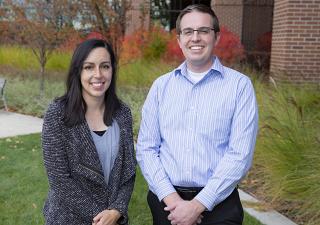The Department of Psychiatry gives residents the opportunity to train in Addiction Medicine and Addiction Psychiatry to help those battling substance use disorders and addiction through our fellowship programs.
While most medical professionals know someone impacted by addiction or have even lost a friend or family member to it, not many are aware that they can be part of the solution. In addition to the Addiction Recovery Services offered by HMHI, the Department of Psychiatry gives residents the opportunity to train in Addiction Medicine and Addiction Psychiatry to help those battling substance use disorders and addiction through our fellowship programs.
From family medicine and internal medicine to occupational medicine and obstetrics and gynecology, our fellows hail from a variety of specialties. And though interest in addiction support continues to grow, the stigma patients feel remains. It’s an issue we strive to address in all of our programs, including our new addiction consultation liaison rotation at the University of Utah Hospital. In addition to taking care of patients and their needs, we provide education for providers and staff who may have negative perceptions of people with substance use disorders or other addictions.
“We’re one of a handful of programs in the country where we co-train our addiction psychiatry and addiction medicine fellows. They do some different rotations, but we train them together on didactics.”
Elizabeth Howell, MD, Training Director
“We work to promote non-stigmatizing language to ensure patients are treated with dignity and have access to proper care,” says Howell.
By gaining experience in Addiction Psychiatry and Addiction Medicine, these future physicians can provide more holistic patient care, providing another crucial line of defense against mental illness, including addiction.
Fellowships That Strengthen Community Ties
Addiction Medicine Fellowship
Our Addiction Medicine fellowship program is offered by the Division of Adult Psychiatry. Addiction Medicine fellows have completed three or more years of another specialty training before they enter the year-long fellowship. Fellows train at HMHI, University of Utah Hospital and Community Clinics, and the Salt Lake City Veterans Affairs Health Care System and community-based programs. Clinical rotations emphasize primary care rotations while learning addiction medicine. These rotations range from inpatient and outpatient addiction medicine and addiction psychiatry to SUPeRAD (Substance Use in Pregnancy Recovery Addiction Dependence) and addiction treatment for vulnerable veterans.
Addiction Psychiatry Fellowship
The Division of Adult Psychiatry also offers the Addiction Psychiatry Fellowship. Addiction Psychiatry fellows have completed four years of psychiatry training after medical school. Similar to fellows in the Addiction Medicine program, Addiction Psychiatry fellows train at HMHI and the Salt Lake City Veterans Affairs Health Care System, with rotations at the University of Utah Hospital.
HRSA Addiction Fellows
The Department of Psychiatry received the HRSA grant to add two more Addiction Medicine slots (for a total of five) and two more Addiction Psychiatry slots (for a total of four) from 2020–2025. With the potential to add 20 new medical trainees, these fellows will receive extensive training in rural, tribal, and underserved communities around the state. Through our HRSA program, we aim to increase the number of Addiction Medicine and Addiction Psychiatry sub-specialists and provide fellows, faculty, and community organizations training in Opioid Use Disorders (OUD) and Substance Use Disorders (SUD).
“Our programs allow us to deepen longterm relationships with the communities our fellows serve, like the Utah Navajo Health System. Many of these people don’t have running water, electricity, internet, or phone service. Not only are we helping communities in our own way, but our fellows are now learning what it truly means to be living in a rural, tribal, or underserved community.”
Elizabeth Howell, MD, Training Director, Addiction Medicine and Addiction Psychiatry Fellowships

